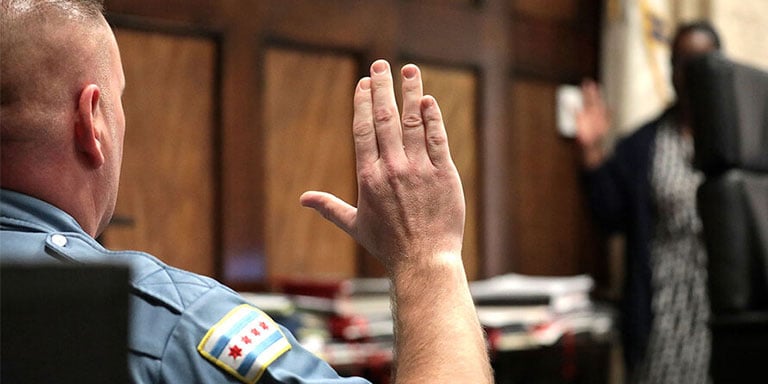

Every police officer, at some point or another, will have to give testimony in a courtroom. These appearances can range from local traffic court all the way to federal court. Many times, the strength of a case rests on the officer's ability to provide effective testimony.
As with other aspects of the job, police courtroom testimony is a complex subject that requires practice, study and attention to detail. We'll tell you how to prepare, how to handle questions and what to expect in the courtroom in general.
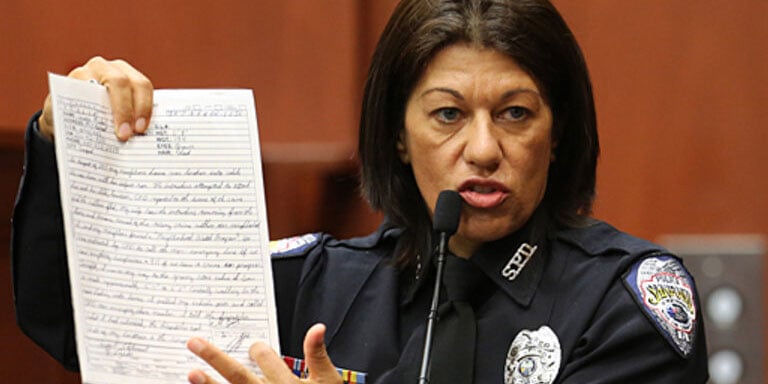
The single most important document in any officer's testimony is their incident report. Police officers testify from their knowledge and memory, but they can also use their report to refresh their memory.
A well-written report is the key to a successful court appearance. An officer who writes a poor or inadequate report may see the case dismissed by the prosecutor before trial. Flaws that mix up, confuse or misstate essential facts may be fatal to the case.
The period between the event and the trial itself may be as long as several years. Memories fade, and some details may become confused with other similar cases the officer may have handled. The report should tell a story in the officer's own words, describing the who, what, when, where, why and how of the investigation. A good report should be in chronological order, starting with how the officer became involved in the case. The report is an official record that should refresh the officer's memory, bringing the details of their testimony back into focus.
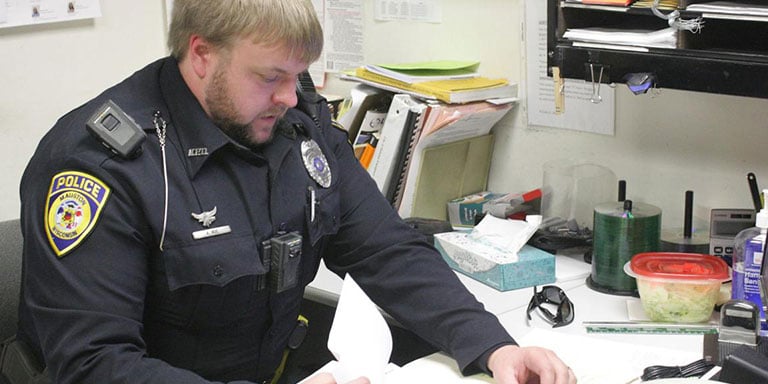
Upon receiving a subpoena to testify, the officer should immediately start to prepare. Preparation for a minor traffic case obviously differs from what is required for a significant jury trial. Even in a traffic court case, though, the officer should review available documents and think back to the incident. If video or audio recordings were made, they should carefully review those, too.
A significant case, such as a homicide or an armed robbery, requires a lot of preparation. When a defendant is facing a substantial prison sentence, it's essential to have a clear memory of all the facts of the case.
Testifying police officers can learn important information from the prosecuting attorney to help with preparation. First, it is nice to know if the case will either be a jury trial or a bench trial (a bench trial has a judge but no jury). Bench trials tend to have much less theatrics that are often used to impress a jury.
It may also be helpful to know the identity of the defense lawyer. Are they a public defender or a private attorney? If other officers have previously faced this attorney, they may be able to provide information on the attorneys' style and demeanor during cross-examination. A competent attorney will thoroughly study the officer's report and any other reports about the incident. By the time the trial begins, they will probably know the reports' contents better than the officer, so be prepared.
A significant portion of the officer's preparation will be spent reviewing their reports and any other reports written on the incident. This review includes any audio or video recordings. Reading these reports, the officer must look for any errors or inconsistencies in them and make the prosecuting attorney aware of them.
Defense attorneys may challenge an officer's knowledge of the case, the officer's understanding of the law or the officer's knowledge of policies and procedures. Study the reports, study the law that was violated and study policies applicable to each officer's actions in advance.
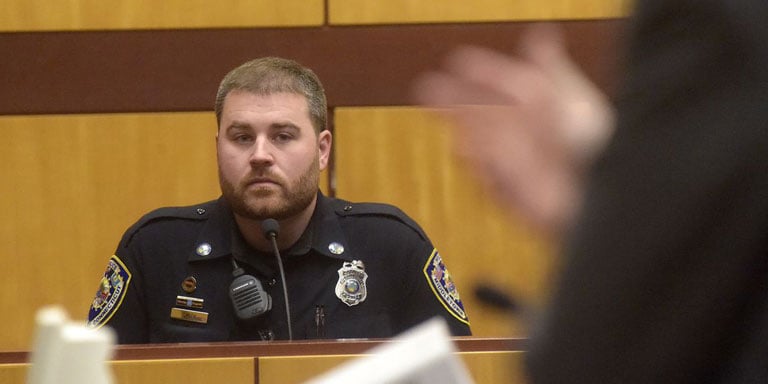
Direct examination is when the prosecuting attorney questions the officer, allowing them to present evidence to prove the case. This consists of open-ended questions, enabling the officer to answer and explain fully. The questions usually follow the officer's written report closely. Questions asked on direct examination should be reviewed with the prosecutor before trial; there should be no surprises during direct examination. If there are any surprises, they will come during cross-examination.
Cross-examination follows direct examination. It's the defense attorney's opportunity to question the officer (or any other witness) about their direct testimony. Cross-examination uses leading questions so the defense attorney may control the officer's responses. Most questions are designed seeking a yes or no answer.
A testifying officer won't know what to expect during cross-examination, so direct examination is the time to address any possible errors or inconsistencies in the officer's report. This allows the officer to explain them and defuse them before cross-examination. Here's an example.
An officer may write that an incident occurred on May 12th, when other reports show the incident happened on May 11th. On direct examination, the officer can address the error and explain that they accidentally entered the wrong date — a simple mistake. If the error isn't identified and addressed by the prosecutor, the defense attorney will use it to impeach the officer's credibility and challenge other facts in the officer's report. If the officer and prosecutor fail to correct errors during direct examination, the cross-examination questioning from the defense attorney might go something like this:
"Officer, did you write this report?"
"Is this report accurate?"
"The report indicates the incident occurred on a date other than May 11th. Is that what your report says?" (The lawyer will show the officer a copy of their report with the wrong date circled in red.)
"Well, given that the incident actually took place on May 11th, how many other errors are in this report? How can we know that anything in the report is factual at all?"
Many cross-examination questions start with "Officer, isn't it true that. " An effective cross-examination consists of questions where the defense attorney already knows the answers. It is their job to try to build reasonable doubt — this includes attempting to discredit the investigating officer's testimony, reports or investigative techniques. That's why it's vital to provide accurate information to the prosecutor before trial.
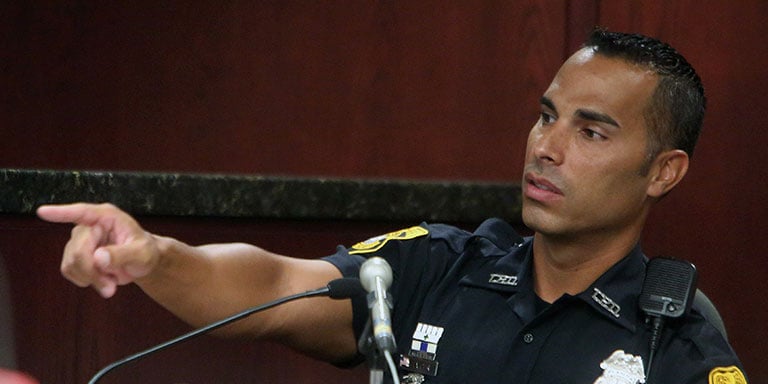
First, it is important to make a good first impression visually. A suit and tie are the standard for most trials, especially jury trials. It is unfortunate, but many believe that an officer testifying in uniform may negatively affect some jurors. The uniform may remind them of the last time they were pulled over, given a ticket or even arrested.
Everyone gets butterflies or becomes nervous when testifying. Generally, these feelings subside during the well-planned direct testimony. Because over half of all communication is non-verbal, it is important to make a favorable impression on the jury. Sit up straight and remain composed. Fidgeting is a typical response to nerves. Officers should refrain from hand wringing, finger tapping or repeatedly touching their face, actions which are all visible to the jury. If nervous ticks are a problem, an officer can try flexing and relaxing their toes. This is an old but effective trick. Because the jury box hides the lower body, no one sees this movement, and the officer can calm their nerves while the jury is none the wiser.
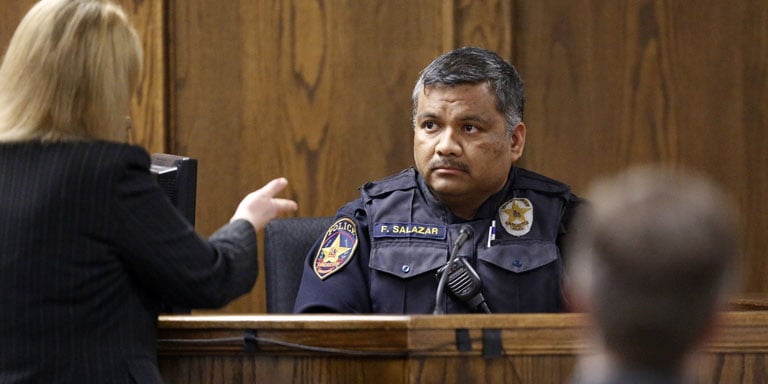
During every moment an officer is on the witness stand, they must actively listen to every word of the trial. Active listening is a skill police must practice. If the officer doesn't listen to every word in a question, they will likely not provide an accurate answer.
An officer's direct testimony should go smoothly, as it has been previously reviewed with the prosecutor. However, if you have a prosecutor who is overworked or does the case review thirty minutes before trial, that's a problem. Officers expected to give a significant amount of testimony should meet and review the case at least a day or two in advance. If the prosecutor doesn't reach out to the officer, the officer should call and arrange an appointment with them for a case review. Once they learn the questions that are likely to be asked, they can study their report until their answers are well-thought-out and accurate.
Assuming they prepared properly, the officer can (and should) take their time when answering each question. Give the prosecutor your full attention, even though you know the rest of the question and the correct answer before they finish speaking. After the prosecutor finishes asking the question, pause for a moment as if considering the appropriate answer, then look directly at the jury and deliver the answer. Defense attorneys hate when they see this because they recognize that the officer has been adequately prepared, and a well-prepared officer makes the defense attorney's job more difficult.
Officers have to be on their toes during cross-examination. The defense attorney will try to destroy the officer's credibility in various ways. They may raise their voice, trying to get the officer rattled or angry. They may act condescending. Remember always to remain calm. They may try to use big words or unfamiliar phrases; just answer honestly. They may ask something like, "Officer, during your entire investigation, did you identify any exculpatory evidence?"
While many officers may have a general idea of what exculpatory evidence is, it's still a good idea to ask for a question like this to be rephrased. Never play a word game with a lawyer — words are their area of expertise.
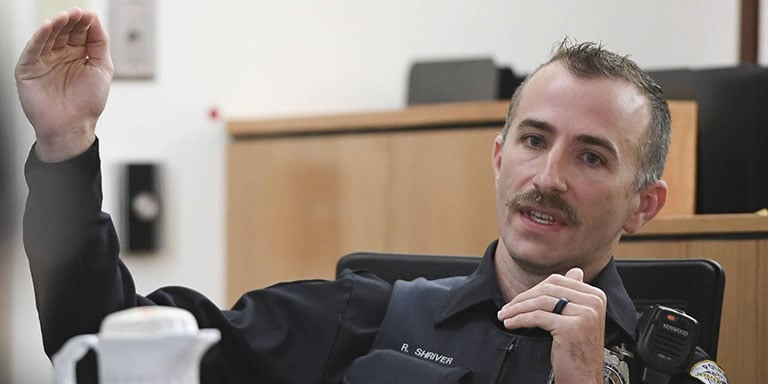
Never guess about anything unless you are asked for an educated guess. A good rule to follow during cross-examination is to try to answer only "Yes," "No," or "I don't know." Remember, there is a reason behind every question a defense attorney asks. Keep answers short, direct and never volunteer additional information.
One tactic some attorneys try to use is the exaggerated pause. They ask a question, and after the officer answers, there is nothing but silence. They want that silence to indicate that the officer isn't done answering and should say more. Do not fall for that. After answering, wait quietly for the next question. Most judges will tire of this quickly and tell the attorney to move on.
When questions are asked that may hurt the case against the defendant, the officer should answer in the same professional tone as any other answer. Trying to minimize an answer that's negative to the case may demonstrate officer bias. A good police officer should only be concerned about presenting the facts, not winning or losing the case.
Often during an officer's testimony, one of the lawyers will yell that they object. If this happens, immediately stop talking until the judge has ruled on the objection. Never try to explain an answer. If a question cannot be accurately answered with a yes or no, a witness can make this known to the judge, who will decide if you can give a longer answer than yes or no.
Never argue with a defense attorney or allow your emotions to show. Even if something is funny, try to refrain from laughing. Remember, be respectful at all times while on the witness stand.
Trial preparation begins with a well-written report. Excellent reports give the defense attorney little ammunition to find fault. Soon after receiving a subpoena, the trial preparation process should begin. Make an effort to meet with the prosecuting attorney and review potential questions before the day of trial. Make the prosecutor aware of any errors in case reports.
The more prepared an officer is, the less nervous they should be. Enter the courtroom as a quiet, respectful professional. It's all right to have an air of confidence, but never act cocky. Listen to every word of every question asked. Answer questions fully, but show no emotion. Be prepared for the defense attorney to attack (or at least challenge) your report and testimony.
When the testimony concludes, walk out of the courtroom showing a respectful demeanor, confident that you told the truth. It's up to a jury to decide guilt or innocence based on all the evidence. No testimony given by any officer will ever be perfect, at least in his or her own eyes. Police officers do their best in every case, and with each court appearance, they gain important experience and knowledge for their next courtroom challenge.
Did you find this article helpful?